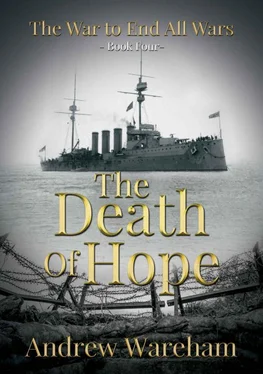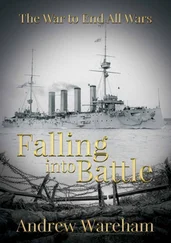“First Battalion, Northamptonshire Shoemakers, sir. A ‘pals’ battalion. Major Portman acting in command.”
“Whose brigade?”
“Brigadier Baker’s, sir. Six battalions, two brigades, in the barracks here, sir. The remaining brigade is in the old barracks at Reading, sir. Not too far distant.”
“Good. Let’s have a look at them.”
The better part of eight hundred men in their ranks, mostly young, below the age of twenty, all fit and healthy, the medically unsuitable weeded out. They presented well, smartly uniformed, rifles clean and held properly. The sergeants were older men, most with ten or more years in, gleaned from the old professional Army.
“Good looking battalion you have here, Portman. Are the others in the barracks the match of them?”
“Pretty much, yes, sir. Two of them are smaller men, across from the Black Country – they come a bit stunted there. One of them is from Dorset – half the men six-footers.”
“The Guards were always used to recruit there. Tall men in those parts for some reason. You have no colonel?”
“Coming in this week, sir. Sick list after the Dardanelles.”
“Knows his way around, then. What of your Mess? How many with experience of France?”
“None of us, sir. Myself and one captain who saw the Boxers. That’s it. The bulk are no more experienced than the men. Same in all of the brigades, I am told, sir.”
“Explains why they sent us across, Portman. A good parade. Thank you.”
The formal exchange of salutes commenced and the general withdrew and the men marched off to put on working uniforms and return to the hard slog of drill and practice in the butts.
Richard wanted to see his own people.
“What is my brigade, do you know, Portman?”
“Us and Princess Patricia’s Isle of Wight Rifles; Twelfth Wiltshires – Moonrakers, that is, sir.”
“Princess Patricia’s…”
“Yes, sir. Apparently, Her Highness has some connection with the Island, sir. They are Hampshires, I think. Their colonel has a slight lisp.”
The three maintained straight faces.
“How very unfortunate, Portman! We should not mock the afflicted!”
“Of course not, sir.”
General and Brigadier parted company, each led by a warrant officer to his set of offices and his personal quarters and then to meet his immediate juniors.
The offices had been recently and quickly constructed, were little more than waterproof huts, each big enough for a dozen desks. The senior officers had their separate rooms, all furnished to the official pattern and with an anteroom for the staff.
“Messing, sir. Brigadier is to dine in his own quarters for weekends and two days, rotating around his three Messes for luncheon and Dining In with each once a week. Your quarters are one of the houses over on the Reading road, sir, about a quarter of a mile distant.”
The Dining in was a nuisance, demanding too much formality, useful for bringing him into contact with the officers of each battalion.
“I shall pay fees to each Mess, of course.”
The warrant officer made no comment – each brigadier had his own habits.
“Are you in charge of my people, WO?”
“No, sir. I am a Moonraker, sir. Reached retirement age in ’14, sir, and was asked to stay on and get the new battalions up and running. When you go across to France, I shall be sent to another new battalion, sir, or to assist with the training of the conscripts, who are to be sent out to existing battalions in France rather than be made into their own battalions. I was refused for active service because of age, sir.”
“Wet, cold and muddy – it is no place for a man who has done his twenty years already.”
“So they tell me, sir. I have survived the mud in West Africa and the cold in China, sir. Take more than that to put me down.”
“What’s your name?”
“Freeman, sir.”
“Speak to me just before we go out in May, Freeman, if you are still of the same mind. I will arrange something.”
“Thank you, sir. Have you a warrant officer for your cadre, sir?”
“Coming in from France tomorrow. One of my Bedfordshires.”
“Very good, sir. I shall show him the ropes. Luncheon with the Dorsets today, sir. All of the Brigade’s field officers will be present.”
“Very good. Pass the word, please, that I expect working dress to breakfast and luncheon, Monday to Friday.”
“Habit has been to wear mess dress, sir, except when the battalion has been out on a route march. Once a week, that is.”
“A full fifteen miles in five hours with sixty pound pack and rifle?”
“Not quite, sir.”
“Pass the whisper, if you would, Freeman. Let it not come as too great a surprise.”
“The men will be able to handle it, sir.”
Richard noticed the lack of reference to officers.
“I suspect I must march along with the columns myself, Freeman.”
The warrant officer permitted himself a quick smile.
“That could offer a fine example, sir. Provided, of course, sir…”
“That I managed a full fifteen miles and still looked chipper at the end?”
Freeman left to pass the word that they had a soldier in command – a proper hard bastard, too!
Richard took to the telephone, reached the butler at Lord Elkthorn’s London house.
“Miss Patterson is out at the moment, sir. Shopping, one understands. She is due to attend an afternoon performance, a matinee of Joy-Land, in support of the Soldier’s Fund, sir. She is to dine here this evening. Might I suggest a call at seven o’clock, sir?”
Richard agreed – one did not argue with butlers, he had learned that.
Primrose was delighted, more with his presence in England than with the promotion.
“I am here till May. Taking the Brigade across to Flanders then. I can take four weeks in late February or March and April. Would you wish us to wed then?”
She would, at some length.
“I can get to London on Saturday and Sunday. Can you put me up or must I use a hotel?”
A hotel was wiser, she thought, removing them both from temptation.
“It is only January now – I must not risk a six months child, Richard!”
He agreed that would cause an upset in Society, was amused that she could discuss such an eventuality so calmly. He also noticed that she was looking forward to getting into a bed with him; he was in favour of that.
“A date for our wedding, my love?”
“I shall discuss all with my esteemed parents, Richard. We can come to an exact conclusion on Saturday.”
Three months passed rapidly, chasing his colonels, discovering two of them to be experienced in the new ways of war, one to be hopelessly out of contact with reality.
Colonels Moncur and Barnard-Hope had seen how modern war was fought, Moncur having just recovered from wounds taken at the Dardanelles. Barnard-Hope had been sent back from Flanders to give the benefit of his sixteen months of experience. Appleby had spent the war in garrison in Liverpool, recruiting Lancashire mill-hands and eating dinners with the local gentry; he was distinctly plump.
“Parade ground is the place for the men, sir! Learning to counter-march and form their files to left and right, column to line to square – that’s the way to do it!”
“We don’t have parades in the trenches, Appleby. No room for them.”
“Ah, yes, sir! Perfectly correct! The thing is, parades and drill teach the men obedience! That’s what they need!”
Appleby’s every sentence came as a half shout, normally emphasised by a fist slapping into the palm of his other hand.
“I rather like to encourage initiative among the men, Appleby. I like them to think for themselves.”
“Think, sir? Rankers don’t think! Only our sort of chaps who can think! If they could think, they wouldn’t be rankers! Stands to reason! I mean to say, sir, where would we be if the louts in the streets thought for themselves? Be the end of the world as we know it! No, sir. Drill, drill and more drill – that’s what they need!”
Читать дальше












